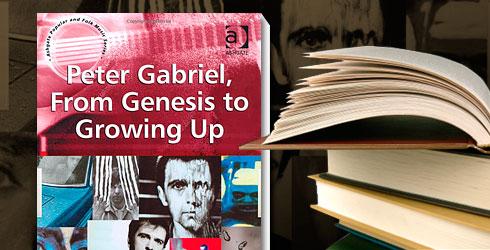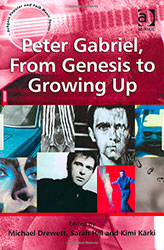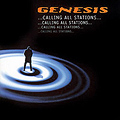


One thing one cannot complain about these days is a lack of publications about Genesis or Peter Gabriel. Both the band and the solo careers it spawned have become the subject of fan publications, biographies and interview collections. The volume at hand, however, is quite a different sort of book. Ashgate, a British publishing house with a very good reputation, have been bringing out books in a series of their that focuses on musicology and is simply style the Ashgate Popular and Folk Music Series. Another volume in this series, Kevin Holm-Hudson's book on Genesis And The Lamb Lies Down On Broadway (2008), has also been reviewed for this site.
The book title already indicates that this collection of essays about Peter Gabriel's works covers quite a long period of time. Some of the essays examine Gabriel's time in Genesis, though the majority looks into his solo careers up to and including the (Still) Growing Up tours. As usual with miscellanies the editors, three lecturers of Musicology, Sociology and Cultural Studies at universities in South Africa, Wales and Finland, have tried to provide some legitimation and a framework for the essays.
Like many cultural studies, Musicology has undergone major changes in the last two decades. New methods have been introduced, but the biggest change was a change of focus: Topics that were not deemed worthy of scholarly attention have become relevant and interesting. Light fiction, for example, was not considered to be of sufficient quality to be analyzed in literature classes at universities. Historians have moved their attention from the „deeds of great men“ to subjects like everyday life and the points of view of oppressed people; and, finally, musicologists have come to accept popular music as a serious field of studies.
Before this collection was assembled there were hardly any studies that examined the impact Peter Gabriel may have had on music and/or culture. The editors find it therefore not at all difficult to prove their point in the introduction that they have closed a gap with this book. They also do not succumb to the temptation to cover „everything“, but focus on three main topics:
I. Identity and Representation
II. Politics and Power
III. Production and Performance
The initial essays in particular look at Gabriel's artistic biography, the development of his stage personality and the way he presents himself to the public in general. They delineate how he developed from a „prog man“ to a „world music man“ and outline the change from an eccentric person and „pop star against his will“ to a performer who considers authenticity, openness and an immediate contact with his audience paramount. The afore-mentioned Kevin Holm-Hudson discusses the strong influence soul music had on Gabriel. Of course Gabriel has been known to mention his affinity for the music of Otis Redding and Marvin Gaye, but the influence is pursued to a far larger degree. Gabriel's vocal performance in his time with Genesis, Holm-Hudson argues, shows traits of soul music, particularly in the phrasing and the way he uses timbre. Of course the later and more obvious reverences to soul are also mentioned. Holm-Hudson also shows that though critics belittled Steam as „son of Sledgehammer“ these two songs actually refer to two distinctly different traditions of soul and rhythm 'n blues: Slegehammer was obviously Motown-inspired while Steam drew from Stax productions. These borrowings did not happen for nostalgia's sake (as in the case of Phil Collins' Going Back) as one can see from the modern production that caters to the listening habits of modern rock and pop as well as from the lack of visual references to the soul and RnB music of the 1960s and 70s.
 The essays cover a remarkable range of topics and methods. The video productions for Sledgehammer and Mercy Street are discussed, and so are Peter Gabriels status as a reference point in production („I'd like my record to sound like this“), as a promoter of innovation in recording technology as well a stage design and live performance. Kimi Kärki interprets Gabriel's collaboration with the Canadian theatre artist Robert Lepage as a kind of return to Gabriel's progressive roots, albeit under different auspices and with modern technology. In the beginning of the solo career his stage show may have been bare and his artistic persona, but, as Jeffrey Callen points out in his essay on the 'Security Tour 1982/3', Gabriel soon began to use theatrical devices again like masks and make-up and a more sophisticated choreography and dramaturgy of his shows.
The essays cover a remarkable range of topics and methods. The video productions for Sledgehammer and Mercy Street are discussed, and so are Peter Gabriels status as a reference point in production („I'd like my record to sound like this“), as a promoter of innovation in recording technology as well a stage design and live performance. Kimi Kärki interprets Gabriel's collaboration with the Canadian theatre artist Robert Lepage as a kind of return to Gabriel's progressive roots, albeit under different auspices and with modern technology. In the beginning of the solo career his stage show may have been bare and his artistic persona, but, as Jeffrey Callen points out in his essay on the 'Security Tour 1982/3', Gabriel soon began to use theatrical devices again like masks and make-up and a more sophisticated choreography and dramaturgy of his shows.
A critical point of view is taken in the essays on the political impact of Biko and on Peter Gabriel's role as a supporter and promoter of World Music. Biko, for example, became a kind of anti-apartheid anthem in the world outside South Africa. In South Africa, both the single and the album (Peter Gabriel III, aka Melt) were prohibited during the apartheid. Did Biko just salve the west's conscience? How was the song received in South Africa, particularly after the end of apartheid? It is interesting to note that this song prompted several Western musicians and artists to take a closer look at the situation in apartheid South Africa. The essay on Biko also examines the musical devices that were used to make Biko a protest song with the flair of an anthemic battle song. The use of original South African music, hoarse battle cries and the simple drum rhythm evoke an image of primitive nativeness and tradition.
Timothy D. Taylor picks up on this. He reads Gabriel's appropriation traditional music from Africa and Asia as colonial behaviour and criticises it. He analyses Gabriel's use of recordings of African musicians (some of who were not even asked about it) from a postcolonial point of view. Though they may „mean well“, as in Gabriel's case, the unauthorised use of music as well as the integration of elements from traditional music and folklore into their own songs (for which they, and Gabriel, then claim exclusive copyright) is in his eyes a behaviour typical for people from the western world. With it they still only perpetuated the idea of a cultural hegemony of the industrial world and of western culture. Dave Laing tries to address such harsh criticism with a more differentiated stand – evidence for the editor's refreshing approach to present contradictory interpretations. Laing is far from regarding Gabriel as a saint, but he regards Gabriel's approach to world music from another point of view by stressing the different roles Gabriel plays towards world music as a producer, musician and entrepreneur. Laing identifies the asymmetric relationship between western pop musicians / producers on the one side and musicians from developing and threshold countries on the other as the core problem. Gabriel, he states, cannot really escape this trap, but he may still be regarded an impressive exponent who uses his own popularity to provide ears and a market for music that may not fit the current patterns of consumer listening habits.
There are a couple of essays that cover various odds and sods like Peter Gabriel's use of the flute, mainly in his time in Genesis, or the phonographic orchestration of Gabriel's voice in Blood Of Eden and Digging In The Dirt. His flute playing is put into the larger context of rock music. The essay does not make Gabriel an Ian Anderson, but it argues convincingly that his mainly pastoral sound a unique as far as the use of the flute in rock music is concerned – and that is more than just something to occupy him while he does not sing. The analysis of the way Gabriel's voice is orchestrated provides new insights even for the seasoned Gabriel listener, e.g. how the musical arrangement is used to convey central ideas and characteristics of the lyrics. One example given is the vocal part of the Digging In The Dirt chorus block which features two, at times even three vocal tracks: The fact that these vocal tracks are not identical and in fact do not even have the same phrasing suggests the torn personality of the speaker – someone who is at odds with themselves. Serge Lacasse, the author of that essay, also reads the variations in the vocal performance as a subtle musical device to enhance the message of the lyrics: calm verses, an aggressive 'pre-chorus' and first part of the chorus („This time you've gone too far...“ / „Don't talk back...“) to the quieter second part of the chorus („Digging in the dirt...“).
The essays in this collection come from a wide range of disciplines and employ quite a range of different approaches. The general (fan) public will occasionally have some difficulty understanding some concepts. Other things may seem like trivial and well-known facts. A careful reading of all the essays gives the reader an impressive idea just how profound the things are you can examine in Peter Gabriel's work. The range of topics is as delightful as the sound standing of the essays. This book addresses itself to the scholarly reader. A certain level of acquaintance with cultural theories and methods will make it easier to digest the professional vocabulary and the methodological basis. Those who do not shy away from this superstructure will find a plethora of insights into Peter Gabriel's works. The book will have its own impact on the scholars. As far as the fans are concerned it is great to see that the music of Peter Gabriel and company have entered the sphere of musicological relevance, and that the scholars come up with interesting insights.
by Jan Hecker-Stampehl, English by Martin Klinkhardt




Last Genesis Studio album from 1997. Remastered Version from 2007 with new Stereo Mix.
Review available